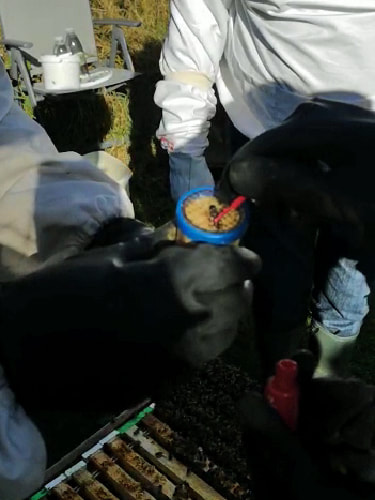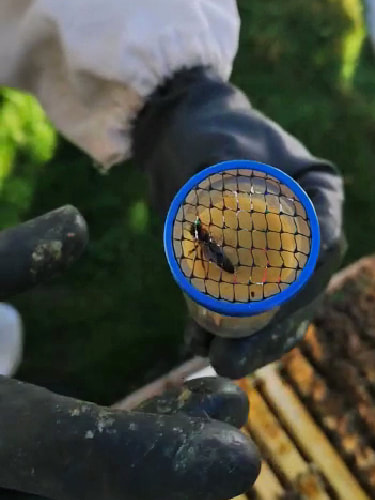|
So far, it's been a busy summer for our honeybees and beekeepers alike. 18 months after installing our first hive we are now the proud owners of two healthy hives and a David Bellamy/British Beekeeping Association award for Nepgill Park's bee-friendly conservation efforts. During routine hive inspections this spring, our bee team noticed the colony was preparing to expand and produce a new queen. When queen cells are discovered in a strong and healthy hive, it's time to split the hive in two to prevent swarming. The bee team successfully transferred a frame containing one of the queen cells (accompanied by nursery and worker bees to rear the new queen and her offspring) into a vacant second hive installed nearby. When hatched and successfully mated, the queen lays around 1,500 eggs a day, so once we saw that the queen was laying and the hive was happy with their new queen, we marked her thorax with a dab of red colour for easy future identification. A big challenge during the summer months has been protecting the hive from invading wasps, which raid the hive of its honey reserves. When attacked, the hive's guard bees respond by surrounding the invading wasps in large numbers. As the bees accumulate so does their body heat, smothering and eventually killing the intruders. Sadly, many bees are sacrificed in protecting their hive – wasps can sting multiple times, whereas a bee dies after it has stung once. For this reason, we do our best to assist the bees by luring wasps into traps filled with sugary drinks as bait. Another success for the bee team this year has been our first attempt at honey extraction. Thanks to our incredibly productive bees, we extracted five full frames of honey from a total of 14 (leaving some for the bees' winter reserves). Our main task in the coming months will be to prepare the hive for winter, allowing the bees to stockpile food reserves as autumn weather approaches. Topping them up with sugar syrup is hugely beneficial as cooler temperatures and wetter weather reduces their ability to forage for pollen. This extra food enables them to feed their larvae through the winter, ensuring the queen keeps laying and replenishing the hive's population. We've absorbed so much knowledge (coached by our beekeeping mentor Adrian), yet still have much to learn . . . more of which we'll look forward to sharing with you next time.
0 Comments
A year ago today we welcomed our first bee hive to Nepgill Park. Having won numerous awards for Nepgill's bee-friendly wildflower areas over the years, introducing honeybees seemed a natural progression. One year on, we're delighted to report that our honeybees have survived their first winter (and frostiest April on record) and appear to be in excellent health. Shortly after we installed the hive last May, our first colony of bees took up residence courtesy of local Blencogo beekeeper Adrian Cozens. As well as supplying us with bees, Adrian offered to show our community beekeeping team the ropes, sharing his expertise and also mentoring them through their first year of 'socially-distanced' beekeeping! Twelve months on, the knowledge and experience they've amassed is impressive, thanks primarily to Adrian's ongoing support and the team's unwavering commitment. Our six-strong bee team, comprised of park residents and neighbours, share a range of beekeeping tasks throughout the year, including weekly inspections to monitor hive health and activity levels. Between autumn and spring honeybees require supplementary feeding with sugar syrup and prior to winter the hive must be insulated to ensure the survival of the colony. Another key date in the calendar is treating the bees with oxalic acid in January to control their arch-enemy – the parasitic varroa mite.
Now that the bees have settled in and Covid restrictions have eased, the bee team is looking forward to extracting the vast quantities of honey these incredible creatures produce and experimenting with some traditional beeswax crafts, starting with candle making. Plans are also afoot to introduce a second hive as our bee population grows. There's plenty to keep us busy and, hopefully, our bee team will continue to attract new members too. It's free to join and we supply all the equipment needed to tend the hives except for the beekeeping suit, which is up to each individual to provide. If you wish to get involved or learn more about our bees, please contact the Park Office – we'd love to hear from you. |
Nepgill Park BlogWelcome to our blog, bringing you the latest news and updates from Nepgill Park. Whether you're interested in our community projects, conservation efforts, or tips and advice about park home living, we look forward to keeping you posted. ArchivesCategories |
More Information |
|
Nepgill Park is the trading name of Acrebind Ltd, a company registered in England & Wales: No. 02168217.



 RSS Feed
RSS Feed